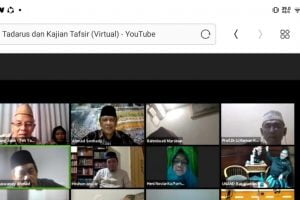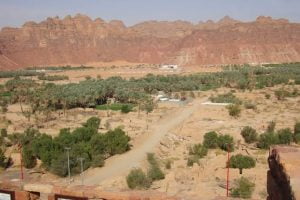
There are three Jewish tribes in Medina that are very famous in the time of the Prophet Muhammad, namely: Bani Quraizhah, Bani an Nadhir, and Banu Qainuqa, besides there are small Jewish tribes, such as: Jews of Bani Auf, Jews of Bani Al-Harith, Jews of Bani Sa’idah, Jews of Bani Jusyam, Jews of Bani Al-Aus, Jews of Bani An-Najjar, and Jews of Bani Tsa’labah (Ibn Hisham, 2002). Based on the origins of religiosity, Jews at that time could be divided into two groups, namely proselytes (Arabs who converted to Jews because of Jewish missionaries) and convert (Jewish-descent communities who embraced other religions). Arab Jewish tribes, such as Bani Auf, Bani Najjar and Bani Tsa’labah are Jewish religious groups that are proselytes (Switching religion to Jews).
Jews have become well-established residents of Medina, even have been inhabiting the area before the arrival of the Aus and Khazraj (Fatmah, 2017). Different from Arab tribes, Jews are skilled people. They are wealthy traders and successful farmers. Al Waqidi (d.823 AD) quotes the testimony of early Muslim Arabs:
Bani Quraizhah are the ancestry of middle-class and wealthy people, while we are only Arab tribes, who do not have dates and grapes, only sheep and camel herders.” (Quoted from Fatmah, 2017)
Even described, camels belonging to Arabs are often hired by the Jewish community to bring their agricultural produce. Jews are literate people, can read and write and have their books and rabbis (religious leaders). The ability to read and write at that time is a special ability.
However, since the arrival of Aus and Khazraj, the dominance of Jews in Medina began to fade. When the Prophet Muhammad emigrated (hijrah) to Medina in 62 AD, the Jews of Medina had become allies for Aus and Khazraj. These two tribes are called Banu Qaylah (attributed to Qaylah bin Kahil). They are new migrants from the South, Azd (Yemen). However, there is no clear evidence of how the Aus and Khazraj Tribes can defeat Jews and become the dominant and powerful tribe in Medina.
Al Isfihani (d. 967 AD) in the Kitab al Aghani tells us that at first the Arabs felt inferior to the Jews. However, slowly the Arabs increasingly climbed and sparkled, while the Jews power gradually getting dimmer, and finally they found themselves in an unpleasant position. If there is a quarrel with one of the Arab tribes, they will seek refuge to the other Arab tribes, not to the Jewish group. Jewish families then seek refuge in the Arab group, Aus or Khazraj (Fatmah, 2017).
The dispute also frequently occurs between the tribes of Aus and Khajraj. According to historians, this conflict happened due to the seizure of economic land that they captured from the Jews through fighting. At the same time, Jews also got experience of conflict between their own families. Because of this, there were some Jews who held peace agreements with Aus, and some chose to collaborate with Khazraj.
Jews at that time preferred to bow down to those in power and tend not to fight. In addition, the Jewish community prioritizes to make the internal protection by building strong fortresses in their residential areas. Meanwhile, the Arab tribes who have been accustomed in violence living, prefer to be hostile and shed blood. Banu Qaylah frequently fought each other (Aus and Khazraj) which later made the situation in Medina uncomfortable and unstable. When they attracted Jews to become supporters, the Jewish group was divided, Bani Quraizhah and Bani Nadhir followed Aus, and Bani Qainuqa followed Khazraj. When these two tribes fought each other, the Jews joined in fighting his brother, even though they then tried to redeem if their brother was captured. Therefore, they practiced as well as left some of the teachings of their own scriptures. This Jewish attitude is described in the Qur’an as follows:
ثُمَّ أَنتُمۡ هَٰٓؤُلَآءِ تَقۡتُلُونَ أَنفُسَكُمۡ وَتُخۡرِجُونَ فَرِيقٗا مِّنكُم مِّن دِيَٰرِهِمۡ تَظَٰهَرُونَ عَلَيۡهِم بِٱلۡإِثۡمِ وَٱلۡعُدۡوَٰنِ وَإِن يَأۡتُوكُمۡ أُسَٰرَىٰ تُفَٰدُوهُمۡ وَهُوَ مُحَرَّمٌ عَلَيۡكُمۡ إِخۡرَاجُهُمۡۚ أَفَتُؤۡمِنُونَ بِبَعۡضِ ٱلۡكِتَٰبِ وَتَكۡفُرُونَ بِبَعۡضٖۚ فَمَا جَزَآءُ مَن يَفۡعَلُ ذَٰلِكَ مِنكُمۡ إِلَّا خِزۡيٞ فِي ٱلۡحَيَوٰةِ ٱلدُّنۡيَاۖ وَيَوۡمَ ٱلۡقِيَٰمَةِ يُرَدُّونَ إِلَىٰٓ أَشَدِّ ٱلۡعَذَابِۗ وَمَا ٱللَّهُ بِغَٰفِلٍ عَمَّا تَعۡمَلُونَ٨٥
“Then, you are those [same ones who are] killing one another and evicting a party of your people from their homes, cooperating against them in sin and aggression. And if they come to you as captives, you ransom them, although their eviction was forbidden to you. So do you believe in part of the Scripture and disbelieve in part? Then what is the recompense for those who do that among you except disgrace in worldly life; and on the Day of Resurrection they will be sent back to the severest of punishment. And Allah is not unaware of what you do.” (Q. Al Baqarah [2]: 85)
Sources:
- Salim Bahreisy dan H. Said Bahreisy, Short Translation of Tafsir Ib nu Katsir Volume 1 p. 151-152.
Abu Muhammad Abdul Malik bin Hisyam Al-Muafiri, (2002), Siroh Nabawiyyah Ibnu Hisyam, Indonesian Edition, Darul Falah, Jakarta Timur.
Fina Fatmah (2017), “Yahudi Di Madinah: Kontribusinya Terhadap Nabi Muhammad Saw,” Jurnal Living Hadis, Vol. 2 Nomor , Oktober, 2017; ; p-ISSN: 2528-756; e-ISSN: 2548-4761, hal. 415-437



